![The album cover of Wilderun's - Veil of Imagination - a slightly surrealist, twisted tree covered in flowers]()
Wilderun’s Sleep at the Edge of the Earth was a revelation. The record was a powerful blend of ideas that was as enchanting as it was addictive. It was epic and sprawling and my (and the staff’s) Record o’ the Year from 2015, and it came with an elevator pitch as snappy as: “Opeth meets Turisas.” And while this is a simplification that does not do the brilliance of Sleep at the Edge of the Earth justice, it is a good reference point. Because after four years, with my understanding being that Veil of Imagination was done for at least a quarter of it, this elevator pitch does not seem to have enticed anyone to pick the band up. This is absurd, as even after Sleep at the Edge of the Earth, the band was clearly among the most exciting bands in metal. But on Veil of Imagination, Wilderun has not only grown, but they have raised the bar for what progressive and melodic death metal can be. Veil of Imagination is one of the most imaginative, beautiful and interesting records that I have ever heard.
Veil of Imagination is a complete album that is worthy of its length. While other bands have referred to their songs as “movements,” the term is the only appropriate name for what Wilderun has wrought. From the fourteen and a half minutes of “The Unimaginable Zero Summer” to the out of tune outro on “When the Fire and the Rose Were One,” everything flows with the kind of practiced grace that few bands not named Pink Floyd or Symphony X have ever accomplished. The pacing, when seen from a bird’s eye view, is genius. Whether Wilderun recapitulates a riff which transitions perfectly between songs (“O Resolution!” to “Sleeping Ambassadors of the Sun”), or subtly changes key and feel over the course of three minutes before merging into the next movement (“Scentless Core (Fading)” to “The Tyranny of Imagination”), the transitions are brilliant and seem effortless. Veil of Imagination even has a three act feel. The first three tracks spend most of their time in 6/8; that unmistakably Opethian swing (clearest on “The Unimaginable Zero Summer”). The next three tracks comprise Act II with a majestic and powerful Turisasian flare (“Far from Where Dreams Unfurl”). And finally, Act III is comprised of “The Tyranny of Imagination” and “When the Fire and the Rose Were One,” which emphasize dissonance and consonance. These sounds, of course, blend throughout the album, but each act has its own emphasis.
Talk of “movements” and “acts” emphasizes that Veil of Imagination is a clear development of the band’s sound toward the truly symphonic. While the transitions are one part of this, orchestral arrangers Dan Müller and Wayne Ingram craft fantastic beds of strings and choirs that make Wilderun distinct. Rather than being a metal band playing with an orchestra, the band is part of the orchestra. This is helped by the combinations of piano and violin (“The Unimaginable Zero Summer” or “Scentless Core (Budding)”) which merge into something always more intense and grand (“Sleeping Ambassadors of the Sun”), with plenty of Finnish New English Man Choir to add an extra layer of drama. The band uses a variety of sounds one rarely hears in metal—harps (“O Resolution!”) or fluttering piano and flutes (“When the Fire and the Rose Were One”)—and these give a true sense of orchestral mastery.
The album’s symphonic nature, of course, still contains a metal spine. Wilderun demonstrates this with Evan’s ferocious death metal growl and classic, if idiosyncratic, metal riffing. Aside from the album breaking out the door with blasts and death metal groove, “Far from Where Dreams Unfurl” features noodly melodic death riffs with counter-intuitive harmonies, while “Tyranny of Imagination” starts out with a sinister symphonic death feel. Joe Gettler’s guitar solos (like on “O Resolution!” and “Far from Where Dreams Unfurl”) are a reminder that these guys just have chops. The same is true of Jon Teachey’s drums pushing into blasts at times or tom heavy fills, while the bass features prominently throughout, with Müller delivering a heavy, driving performance that reminds me at times of Martín Méndez (“O Resolution!” and “Sleeping Ambassadors of the Sun”). Yet, never does the symphonic conflict with the metallic, either thematically or sonically; they work in perfect balance.
![A band photo of Wilderun from 2019]()
The genius of this album is the way it balances contrast both in feel and dissonance. What makes Veil of Imagination something more than just a continuation of Sleep at the Edge of the Earth is it has a unique voice which speaks to its concept. And this is where I worry it will lose some listeners. One of the most interesting and sophisticated things about the album is the way that it plays with dissonance and consonance. This can give the feeling to listeners that the melodies aren’t quite as ‘strong’ as on Sleep at the Edge of the Earth. Close listens, however, reveal evocative ideas that sonically represent the album’s concept. For example, they modulate major keys in “Scentless Core (Budding),” never really staying in one place for long—which builds a sense of uneasiness with blaring horns until the fever breaks down to a single piano. The bridge (at about 4 minutes) in “Far from Where Dreams Unfurl” follows a similar pattern, building tension for almost 90 seconds before releasing. But the peak of this is in “The Tyranny of Imagination,” where Wilderun works with half-steps and naturals in order to keep the tension building. At times this approach reminds me of Septicflesh at their best, but unlike Septicflesh, Wilderun balances these moments with ample resolution. In these moments, Evan’s baritone cleans often work with only a piano or acoustic guitar to cleanse the pallet and set the stage for the next burst of color and flavor.
Veil of Imagination is the result of Wilderun masterfully executing its vision through developments in both composition and style. The album speaks to fundamental human struggles and mirrors the tension and release of negative ideation of the future. This can be seen from the cover art, as well. The beating, surreal heart of Veil of Imagination is a twisted tree draped with blooming flowers—where the fire and the rose met, and where “all manner of thing shall be well.” And time and time again, Wilderun delivered with their aesthetic choices. From a Dan Swanö mix that sounds timeless, to a Jens Bogren master which, while loud, delivers the kind of balance that made his work on Fleshgod Apocalypse and Turisas indispensable. And suddenly, it seems, that Wilderun isn’t just an excellent, if underappreciated band. With Veil of Imagination, Wilderun has arrived at the vanguard of the next generation of progressive and melodic death metal bands. Veil of Imagination raises the bar by delivering an intense, grandiose and sophisticated, yet ultimately human, experience.
Rating: Iconic
DR: 6 | Media Reviewed: PCM (i.e., CD quality files)
Label: Independent
Websites: wilderun.bandcamp.com | wilderun.com | facebook.com/OfficialWilderun
Releases Worldwide: November 1st, 2019
Written By: El Cuervo
![]() It is impossible for me to overstate the excellence of Wilderun‘s 2015 record, Sleep at the Edge of the Earth. I was a relative rookie at reviewing but immediately identified it as a special release, escalating it within another year or two to one of the best albums I’ve ever experienced. 2018 rolled around and my feet began to itch; the three-year album cycle in which most modern metal bands operate did not yield a new release and relative social media inactivity led to awful thoughts that I may not hear a successor. To my simultaneous relief and trepidation, I learned of the November release of Veil of Imagination and obtained a review copy shortly thereafter. The relief arose for obvious reasons, but the trepidation perhaps less so. How could it possibly hope to match my sentiment for Sleep at the Edge of the Earth? I tried to quash my expectations but I still took time out from a holiday abroad to download and sit down with it. What were my initial thoughts? What are my thoughts now, 6 weeks later?
It is impossible for me to overstate the excellence of Wilderun‘s 2015 record, Sleep at the Edge of the Earth. I was a relative rookie at reviewing but immediately identified it as a special release, escalating it within another year or two to one of the best albums I’ve ever experienced. 2018 rolled around and my feet began to itch; the three-year album cycle in which most modern metal bands operate did not yield a new release and relative social media inactivity led to awful thoughts that I may not hear a successor. To my simultaneous relief and trepidation, I learned of the November release of Veil of Imagination and obtained a review copy shortly thereafter. The relief arose for obvious reasons, but the trepidation perhaps less so. How could it possibly hope to match my sentiment for Sleep at the Edge of the Earth? I tried to quash my expectations but I still took time out from a holiday abroad to download and sit down with it. What were my initial thoughts? What are my thoughts now, 6 weeks later?
Veil of Imagination is not a record repeating the formula of its predecessor; it’s denser, more progressive affair. Opener “The Unimaginable Zero Summer” hits like a truck and is offensively long, terribly progressive and dizzyingly dense. It’s a baptism of fire signifying that Wilderun did not write a record just intending to ride the coattails of former glory. The incredible scope of sounds and instrumentation is even wider and these 14 minutes feature some legitimately heavy, overwhelming passages. Wilderun will cater to no one in executing their vision and do not make things easy for the listener. While Sleep at the Edge of the Earth broke the “Ash Memory” suite into four parts, there’s no bite-sized partitioning on Veil of Imagination. This is symptomatic of the record more widely, which is less catchy and more challenging at first blush. It’s a more somber album overall and a feeling of loss comes through. The band’s approach on Veil of Imagination isn’t inherently a bad thing though; it’s not a record full of hooks, but there are melodies which embed on repeated listens and they’re all the stronger in the long run for making the listener work a little.
![]()
Veil of Imagination still features the earthy tone and lyrical themes which tie the sound to folk metal, but is not substantively folk metal anymore. I consider the last record as a folk umbrella, under which resides a fusion of progressive rock, death and symphonic metal. These elements remain but the bouncing, lighter energy has dwindled, replaced with a richer and more cohesive blend which also incorporates black metal, notably on “The Unimaginable Zero Summer” and “The Tyranny of Imagination.” The record is further distanced from Opeth and Turisas as could be heard previously, though fragments surface occasionally. This iteration of Wilderun sounds more unique due, in part, to aesthetic changes. For example, the clean, harmonic, lead guitar tone favored on the band’s 2015 opus arises infrequently, while Evan Berry’s cleans don’t evoke Åkerfeldt as he develops his own, plaintive style.
The greatest change on Veil of Imagination is the development of a more symphonic sound. This is exemplified by the passage beginning at 1:55 on “Scentless Core (Budding).” The transition is literally marvelous; you will truly marvel at it. In this jaw-dropping moment, the penny falls and the listener is wrapped in a hurricane of blasting drums and piano scales, ascending and descending. Wilderun draws their symphonic arrangements, elaborate orchestrations, ridiculous grandiosity and real heaviness into masterful compositions. Not only do they utilize a diverse range of instruments, well outside the purview of the usual symphonic metal ornaments, but more importantly they are arranged with an admirable awareness for dynamics; sometimes utilizing the full orchestra and at other times isolating one or two instruments. I’ve not heard such an excellent integration of classical instruments into metal since Griseus by Aquilus. There are many other moments I could detail but, in particular, I want to note the way the strings flutter at the opening of “Sleeping Ambassadors of the Sun” and at the closing of “The Tyranny of Imagination.” These hark back to John Williams when he is trying to convey the sense of wonder in space used on the Star Wars soundtracks, and the effect is similar here.
![The inside of the digipack for Veil of Imagination]()
Veil of Imagination, if it were not already apparent, is epic. It is epic in vision and execution. It’s not just symphonic by using classical instruments. The album is symphonic in the true sense. Each of these songs is so vast, detailed and cohesive that listening to them is more like surveying an intricate map, where the particular journey adopted by the band leads you through a beginning, middle and end. It simultaneously boasts a wider scope than almost any other music, but is also so minutely detailed that you could take a one minute passage at random from anywhere on the record as the basis of an entire descriptive paragraph. And it feels like that could be done for the entire 67 minutes. All parts stand on their own but contribute to the whole, which is the entire objective of the album format.
I’ve already written nearly 900 words and could write many more. I’ve not even mentioned song of the year candidate “Far from Where Dreams Unfurl,” or how the concept and arrangement of the record as a whole influences the sense of cohesion and completeness. But in summary, I’m left with one more question, and one I expect commenters will want to know the answer to: does my heart swell in the same way as it does for Sleep at the Edge of the Earth? Perhaps not. But that’s a verified 5.0 and a true all-timer. So Veil of Imagination is fighting a Sisyphean battle in that sense. It’s a more challenging record and one which has fewer heart-stopping moments on first listen. But what it is, is grand. Pompous. Ridiculous. Overwhelming. Heavy. Subtle. Ornate. Epic. And it’s the best record I’ve heard this year.
Rating: 4.5/5.0
The post Wilderun – Veil of Imagination Review appeared first on Angry Metal Guy.
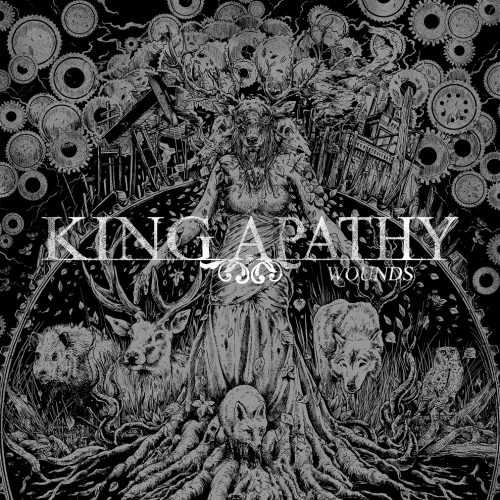 As a pledged and proud purveyor of pessimism and particularly powerful pieces ov post-black pain, it’s probably presumed by you plebs that this puppet perceives positivity and pleasure as pointless and pathetic, practically on par with such unpalatable practices as publicly popping pimples or pooping in the pool.1 Well, be proud, you presumptuous
As a pledged and proud purveyor of pessimism and particularly powerful pieces ov post-black pain, it’s probably presumed by you plebs that this puppet perceives positivity and pleasure as pointless and pathetic, practically on par with such unpalatable practices as publicly popping pimples or pooping in the pool.1 Well, be proud, you presumptuous 
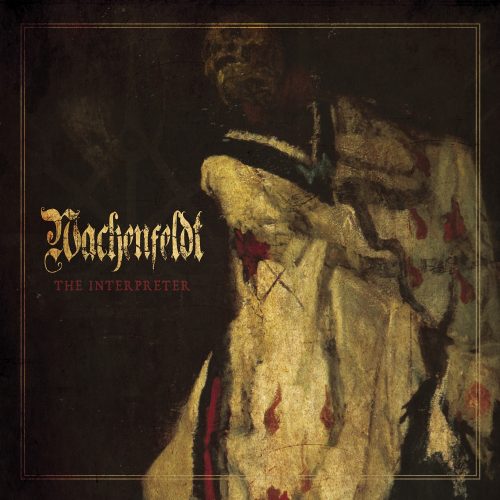 Hello, Friend. Are you still feeling sad because the latest Behemoth didn’t quite tickle your fancy? Are you experiencing anxiety and depression because you’re worried that your occult-themed music isn’t truly glorifying the Evil One?
Hello, Friend. Are you still feeling sad because the latest Behemoth didn’t quite tickle your fancy? Are you experiencing anxiety and depression because you’re worried that your occult-themed music isn’t truly glorifying the Evil One?
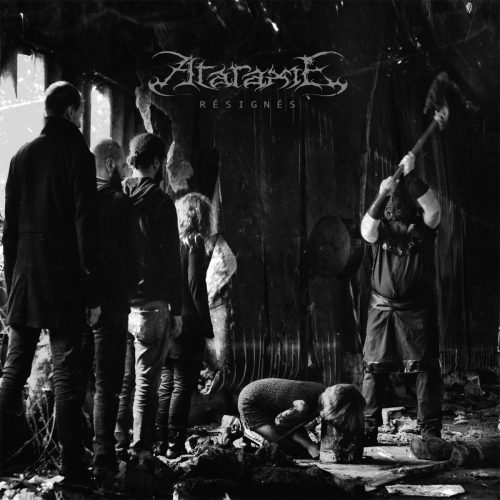 If life really is a tale told by an idiot, full of sound and fury and signifying nothing, then France’s Ataraxie have an unenviable inside line. Doom metal is always downtrodden, and its more extreme iterations never fail to manifest the maudlin. But the inherent ceremony and circumstance rarely coalesce into as voracious a sonic black hole as heard on Résignés. The band’s fourth album is an unnatural aperture into a single moment of crushing and immutable understanding. Although it doesn’t deviate from their discography’s trajectory, it just might perfect it. I often feel like death-doom has a retrospective quality. Lamentations of what could or should have been. Threnodies of times that will never be again. Résignés offers a much more horrific immediacy. This album is the instant the penny drops and reaches terminal velocity en route to the realization that the deaf ears we are screaming into are long dead. Résignês is the moment hope fails.
If life really is a tale told by an idiot, full of sound and fury and signifying nothing, then France’s Ataraxie have an unenviable inside line. Doom metal is always downtrodden, and its more extreme iterations never fail to manifest the maudlin. But the inherent ceremony and circumstance rarely coalesce into as voracious a sonic black hole as heard on Résignés. The band’s fourth album is an unnatural aperture into a single moment of crushing and immutable understanding. Although it doesn’t deviate from their discography’s trajectory, it just might perfect it. I often feel like death-doom has a retrospective quality. Lamentations of what could or should have been. Threnodies of times that will never be again. Résignés offers a much more horrific immediacy. This album is the instant the penny drops and reaches terminal velocity en route to the realization that the deaf ears we are screaming into are long dead. Résignês is the moment hope fails.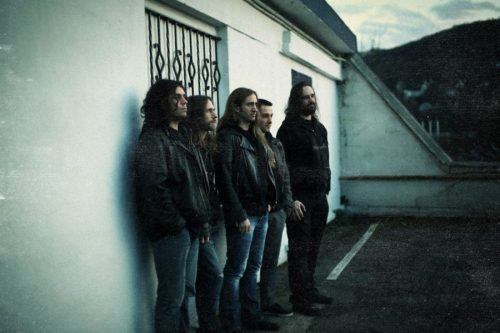
 Confession time: I am not the biggest fan of technical death metal. Don’t get me wrong, I enjoy the classics, such as Death and Atheist, as well as choice cuts from Cynic. But the genre as a whole suffers from either too many scale acrobatics, or way too much chugging on the low string on a 7-, 8-, or even 9-string guitar to even warrant such a overly abused tag such as “technical.” In other words, technical metal bores me to tears most of the time. You know what doesn’t bore me, though? Canada’s Gomorrah.
Confession time: I am not the biggest fan of technical death metal. Don’t get me wrong, I enjoy the classics, such as Death and Atheist, as well as choice cuts from Cynic. But the genre as a whole suffers from either too many scale acrobatics, or way too much chugging on the low string on a 7-, 8-, or even 9-string guitar to even warrant such a overly abused tag such as “technical.” In other words, technical metal bores me to tears most of the time. You know what doesn’t bore me, though? Canada’s Gomorrah. 
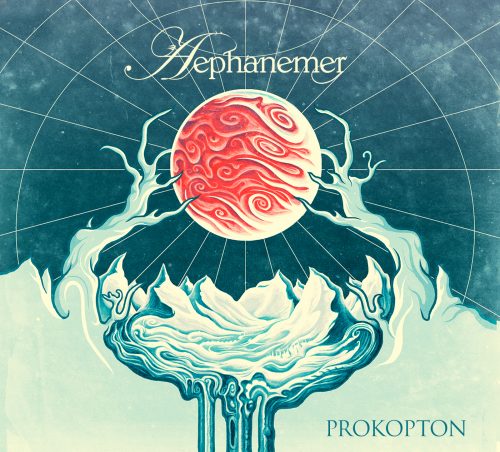 The vaunted sophomore album. The dreaded sophomore album. It’s a metal rite of passage nowadays, fully reflective of our hyper-streamlined society, for the raw and promising to go from who-the-fucks to our favorite bands in an insanely compressed period of time. This tends to be especially true for AMG favorites—see Wilderun, Æther Realm, Khemmis, Cân Bardd, Altars of Grief, Hamferð, etc., etc. Since the opening bars of their 2016 debut Momento Mori, I prayed that someday Aephanemer would assume their rightful place in that most hallowed legion. The French quartet lacked polish, but succulent melodies and an air of elegance buoyed a debut that screamed “Next Big Thing.” But now duty demands patience and a stony gaze; no fanboying allowed. Prokopton must stand on its own, no matter how palpable my priapism.
The vaunted sophomore album. The dreaded sophomore album. It’s a metal rite of passage nowadays, fully reflective of our hyper-streamlined society, for the raw and promising to go from who-the-fucks to our favorite bands in an insanely compressed period of time. This tends to be especially true for AMG favorites—see Wilderun, Æther Realm, Khemmis, Cân Bardd, Altars of Grief, Hamferð, etc., etc. Since the opening bars of their 2016 debut Momento Mori, I prayed that someday Aephanemer would assume their rightful place in that most hallowed legion. The French quartet lacked polish, but succulent melodies and an air of elegance buoyed a debut that screamed “Next Big Thing.” But now duty demands patience and a stony gaze; no fanboying allowed. Prokopton must stand on its own, no matter how palpable my priapism.
 I’ve said it before: we love finding gems amongst the post-apocalyptic ruins of the promo bin. It doesn’t happen often, but when it does it is glorious. Perhaps the name Lör rings a bell? How about The Reticent? Heck, we can throw King Goat in there as well. All examples of unknown acts whose music blew us away. It’s a big part of why we review albums, to be honest. Sure the 0.5 and 1.0 reviews can be entertaining, but we would much rather have people talking about (and buying) the music rather than the review. Which makes me pretty happy to say I’ve found my latest gem in Birth of the Marvellous, the debut album from the shrouded-in-mystery band Sermon. Birth of the Marvellous is two things: it is a cinematic, epic, progressive metal concept album, and it is a masterpiece
I’ve said it before: we love finding gems amongst the post-apocalyptic ruins of the promo bin. It doesn’t happen often, but when it does it is glorious. Perhaps the name Lör rings a bell? How about The Reticent? Heck, we can throw King Goat in there as well. All examples of unknown acts whose music blew us away. It’s a big part of why we review albums, to be honest. Sure the 0.5 and 1.0 reviews can be entertaining, but we would much rather have people talking about (and buying) the music rather than the review. Which makes me pretty happy to say I’ve found my latest gem in Birth of the Marvellous, the debut album from the shrouded-in-mystery band Sermon. Birth of the Marvellous is two things: it is a cinematic, epic, progressive metal concept album, and it is a masterpiece
 In the beginning, there are only faint, oblique details. Scattered hints of an eerie theme repeated by bubbling analogue synthesizers and their faux operatic voices floating in a vast chamber. Syntheosis’ first cut “Void Monolith” leaves the impression of a minimalist prologue for a labyrinthine, perverted science fiction show from the sixties. A depraved homage to Hawkwind and Delia Derbyshire, perhaps. But beneath this ethereal façade, heavier and darker clouds of crumbling riffs stir. And then—the explosion! As the second minute of “The Shamanic Vision” passes by, the coalesced force of Finnish bands Oranssi Pazuzu and Dark Buddha Rising is revealed in its full, utter grandeur. The soundscape is suddenly overwhelmed by a clash of sounds. Malevolent growls of a mad zealot proselytize, recite, and contort while frenzied tremolos and filthy sludge heaviness intertwine with ritualistic rhythms, rolling drums, incisive sitar plunks, and synth-laden drones. It’s a stunning climax to a build-up that announces a record infused with psychedelia, metallic mass, and divination.
In the beginning, there are only faint, oblique details. Scattered hints of an eerie theme repeated by bubbling analogue synthesizers and their faux operatic voices floating in a vast chamber. Syntheosis’ first cut “Void Monolith” leaves the impression of a minimalist prologue for a labyrinthine, perverted science fiction show from the sixties. A depraved homage to Hawkwind and Delia Derbyshire, perhaps. But beneath this ethereal façade, heavier and darker clouds of crumbling riffs stir. And then—the explosion! As the second minute of “The Shamanic Vision” passes by, the coalesced force of Finnish bands Oranssi Pazuzu and Dark Buddha Rising is revealed in its full, utter grandeur. The soundscape is suddenly overwhelmed by a clash of sounds. Malevolent growls of a mad zealot proselytize, recite, and contort while frenzied tremolos and filthy sludge heaviness intertwine with ritualistic rhythms, rolling drums, incisive sitar plunks, and synth-laden drones. It’s a stunning climax to a build-up that announces a record infused with psychedelia, metallic mass, and divination.
 In my three years with this blog, I have never had as much difficulty penning an introduction as with Kull‘s debut record, Exile. This is not due to any conflicting feelings about the subject at hand; rather, I’m petrified of underselling just how monumentally special Kull is to me. Their existence is borne from the ashes of Bal-Sagoth, an English band that is a permanent staple of my listening rotation, and whose output fizzled out just before I stumbled upon them in 2008. Mind you, my ongoing affection for them does not stem from sentimentality or nostalgia. Bal-Sagoth excelled through sheer bombastic fun alone, combining lush orchestrations and thrashing blackened metal with unique tonality ranging from sinister to heroic. No other band sounds like them, making Kull—comprised of four of five Bal-Sagoth members, sans vocalist Byron Roberts—the first new band in over a decade to scratch an extremely specific itch. For me, Exile is a miracle of a record. On its own merits, it’s an absolute triumph.
In my three years with this blog, I have never had as much difficulty penning an introduction as with Kull‘s debut record, Exile. This is not due to any conflicting feelings about the subject at hand; rather, I’m petrified of underselling just how monumentally special Kull is to me. Their existence is borne from the ashes of Bal-Sagoth, an English band that is a permanent staple of my listening rotation, and whose output fizzled out just before I stumbled upon them in 2008. Mind you, my ongoing affection for them does not stem from sentimentality or nostalgia. Bal-Sagoth excelled through sheer bombastic fun alone, combining lush orchestrations and thrashing blackened metal with unique tonality ranging from sinister to heroic. No other band sounds like them, making Kull—comprised of four of five Bal-Sagoth members, sans vocalist Byron Roberts—the first new band in over a decade to scratch an extremely specific itch. For me, Exile is a miracle of a record. On its own merits, it’s an absolute triumph.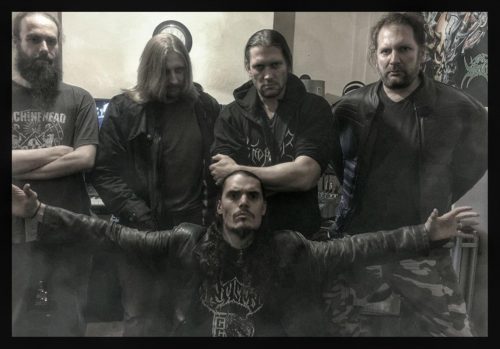
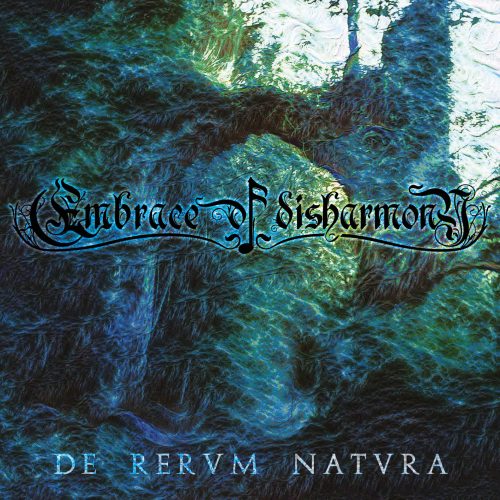 Stagnation is a problem. In this wondrous day and age where music can be shared across the globe at a mere few clicks, you’d think that “too much of the same” in metal would be a laughable concept. Instead, it’s an actual problem. An uncountable number of fledgling bands are being influenced by the same big acts and creating essentially the same sound over and over again. There is nothing more exciting in this musical sphere than a band that breaks the cycle of stagnation, who smashes through stereotypes and clichés both to rise above the rest and revitalize their sad, tired genre. Symphonic metal, I give you Embrace of Disharmony and their sophomore effort: De Rervm Natvra.
Stagnation is a problem. In this wondrous day and age where music can be shared across the globe at a mere few clicks, you’d think that “too much of the same” in metal would be a laughable concept. Instead, it’s an actual problem. An uncountable number of fledgling bands are being influenced by the same big acts and creating essentially the same sound over and over again. There is nothing more exciting in this musical sphere than a band that breaks the cycle of stagnation, who smashes through stereotypes and clichés both to rise above the rest and revitalize their sad, tired genre. Symphonic metal, I give you Embrace of Disharmony and their sophomore effort: De Rervm Natvra.
 While a lack of standards coupled with an uncanny ability to sniff out atmoblack trvffles has certainly made my time in the ranks a little less hazardous than all the prospective n00b reading materials had lead to me to expect, something has been missing from my angry metal experience all the same. Sure, I’ve been fortunate to handle a few excellent albums by some big names that I adore, and Gaerea certainly stand out in the steadily expanding sea of my scribed selections, and yet I am unfulfilled – bitter, even. I write for Angry Fucking Metal Guy, damn it, where’s my Cloak of Ash, my Yodh, The Bleakness of MY Constant? This site has introduced me to countless gems that have captivated me and permanently improved my life in inimitable ways, yet even my most heartfelt exercises in overrating have failed to yield ‘that’ album unto me… until now. With Theia, the sophomore full-length from Austria’s Glare of the Sun, I have found completion, something that fills my
While a lack of standards coupled with an uncanny ability to sniff out atmoblack trvffles has certainly made my time in the ranks a little less hazardous than all the prospective n00b reading materials had lead to me to expect, something has been missing from my angry metal experience all the same. Sure, I’ve been fortunate to handle a few excellent albums by some big names that I adore, and Gaerea certainly stand out in the steadily expanding sea of my scribed selections, and yet I am unfulfilled – bitter, even. I write for Angry Fucking Metal Guy, damn it, where’s my Cloak of Ash, my Yodh, The Bleakness of MY Constant? This site has introduced me to countless gems that have captivated me and permanently improved my life in inimitable ways, yet even my most heartfelt exercises in overrating have failed to yield ‘that’ album unto me… until now. With Theia, the sophomore full-length from Austria’s Glare of the Sun, I have found completion, something that fills my 
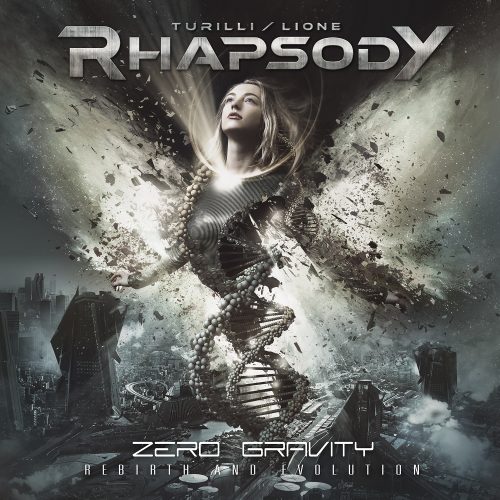 Luca Turilli—the primary composer and guitar hero of various versions of [Luca Turilli’s] Rhapsody [of Fire]—represents one of two types of successful musicians, for me. If one groups successful artists by attitude toward change, I posit that you’ll find two attitudes that can be grouped as either high or low openness to experience. In the group “low openness to experience,” you’ll find bands like Iced Earth, whose founder and primary composer once told a group of fans that he had stopped listening to new music to not be influenced by anything that would change their sound.
Luca Turilli—the primary composer and guitar hero of various versions of [Luca Turilli’s] Rhapsody [of Fire]—represents one of two types of successful musicians, for me. If one groups successful artists by attitude toward change, I posit that you’ll find two attitudes that can be grouped as either high or low openness to experience. In the group “low openness to experience,” you’ll find bands like Iced Earth, whose founder and primary composer once told a group of fans that he had stopped listening to new music to not be influenced by anything that would change their sound.
 One clear evolution is that Turilli and Lione chose to avoid their most notorious tropes from the last two decades. Zero Gravity lacks a narrator, for example, instead, using clips from the Apollo 15 landing to set the feeling. Furthermore, the record makes use of a sound palette that is much more modern and electronic, combining classic orchestrations with electronic sounds similar to Michael Romeo‘s astounding
One clear evolution is that Turilli and Lione chose to avoid their most notorious tropes from the last two decades. Zero Gravity lacks a narrator, for example, instead, using clips from the Apollo 15 landing to set the feeling. Furthermore, the record makes use of a sound palette that is much more modern and electronic, combining classic orchestrations with electronic sounds similar to Michael Romeo‘s astounding 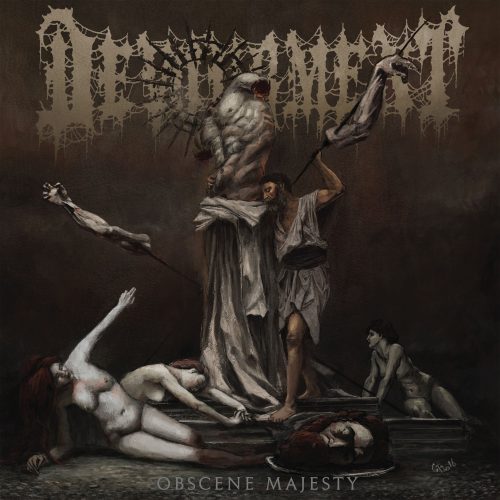 This album will take years off your life. It is exfoliant, defoliant, supreme scourer of the Earth. You’ve heard death metal before. Maybe you’ve even heard slam. Maybe you’re a total slam fiend; even then, you’re still not prepared for this record. Maybe, just maybe, you’re familiar with Christopher Scotese’s work mapping and visualizing continental drift through time. If you are, recall that about 80 million years ago the Indian subcontinent, until this point a background character in tectonics at large, suddenly jettisons Madagascar to the West and just books it North, plowing into Asia to create the geologic equivalent of the Vulgar Display of Power cover. That’s what Obscene Majesty is like.
This album will take years off your life. It is exfoliant, defoliant, supreme scourer of the Earth. You’ve heard death metal before. Maybe you’ve even heard slam. Maybe you’re a total slam fiend; even then, you’re still not prepared for this record. Maybe, just maybe, you’re familiar with Christopher Scotese’s work mapping and visualizing continental drift through time. If you are, recall that about 80 million years ago the Indian subcontinent, until this point a background character in tectonics at large, suddenly jettisons Madagascar to the West and just books it North, plowing into Asia to create the geologic equivalent of the Vulgar Display of Power cover. That’s what Obscene Majesty is like.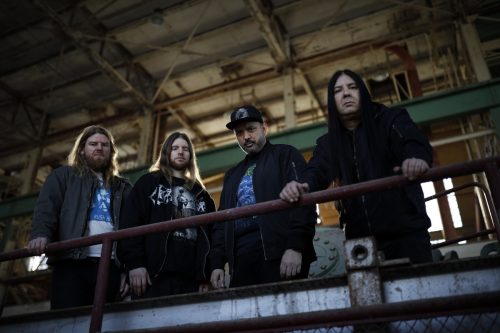
 When you gaze upon the gorgeous artwork adorning the new Atlantean Kodex opus, does it remind you of another classic album cover? Look closely. If your metal mind went back through time to Bathory‘s Blood Fire Death, you win the
When you gaze upon the gorgeous artwork adorning the new Atlantean Kodex opus, does it remind you of another classic album cover? Look closely. If your metal mind went back through time to Bathory‘s Blood Fire Death, you win the  The only complaints I have are minor. Some songs could have been trimmed down a tad, especially the title track which seems to wind out, only to surge back for 4 more minutes, approximating the never-ending ending of LotR III: Return of the King. I could quibble and say the highs here are not quite as high as those on The White Goddess, but these are small matters, and what Atlantean Kodex has wrought is a mammoth victory. The band builds one colossal song after another, full of gripping moments and bold bravado, and the entirety of it is amazing to experience. Markus Becker outdoes himself, channeling John Arch and Hammerfall‘s Joachim Cans as he glides over the hefty riffs like an iron eagle, bringing trve metal to the filthy, oppressed masses. He’s the ringmaster in this legendary saga and takes the songs to places many frontmen couldn’t. Manuel Trummer and new axe Coralie Baier piledrive the album with thick, weighty riffs that straddle the doom and Viking genres adroitly. Their playing keeps the material heavy and full of gravitas no matter how melodic Becker’s vocals get
The only complaints I have are minor. Some songs could have been trimmed down a tad, especially the title track which seems to wind out, only to surge back for 4 more minutes, approximating the never-ending ending of LotR III: Return of the King. I could quibble and say the highs here are not quite as high as those on The White Goddess, but these are small matters, and what Atlantean Kodex has wrought is a mammoth victory. The band builds one colossal song after another, full of gripping moments and bold bravado, and the entirety of it is amazing to experience. Markus Becker outdoes himself, channeling John Arch and Hammerfall‘s Joachim Cans as he glides over the hefty riffs like an iron eagle, bringing trve metal to the filthy, oppressed masses. He’s the ringmaster in this legendary saga and takes the songs to places many frontmen couldn’t. Manuel Trummer and new axe Coralie Baier piledrive the album with thick, weighty riffs that straddle the doom and Viking genres adroitly. Their playing keeps the material heavy and full of gravitas no matter how melodic Becker’s vocals get If there was ever a case of a band’s name totally not fitting their style, we’ve found it here with Fvneral Fvkk. When I see that godawful moniker all I can think of is some lo-fi garage black thrash band that sounds like a demon in a metal trash can getting thrown down steel fire stairs. Luckily, this is not what you get here. Made up of members from Crimson Swan, Ophis and Fäulnis, the band operates under Ghostly aliases, and on their debut full-length they deliver a stunningly effective slab of bleak, despondent doom metal in the vein of Warning and Solitude Aeturnus, with a heavy Woods of Ypres influence making it all the more gloomy and glum. Add an overarching concept about clerical sexual abuse and a uniquely minimalist construction, and you have a piece of music that grips you from the first moment and refuses to let go until the album’s final notes fade away. Beautiful and disturbing in equal measure, this one is something else.
If there was ever a case of a band’s name totally not fitting their style, we’ve found it here with Fvneral Fvkk. When I see that godawful moniker all I can think of is some lo-fi garage black thrash band that sounds like a demon in a metal trash can getting thrown down steel fire stairs. Luckily, this is not what you get here. Made up of members from Crimson Swan, Ophis and Fäulnis, the band operates under Ghostly aliases, and on their debut full-length they deliver a stunningly effective slab of bleak, despondent doom metal in the vein of Warning and Solitude Aeturnus, with a heavy Woods of Ypres influence making it all the more gloomy and glum. Add an overarching concept about clerical sexual abuse and a uniquely minimalist construction, and you have a piece of music that grips you from the first moment and refuses to let go until the album’s final notes fade away. Beautiful and disturbing in equal measure, this one is something else.
 I’ll begin today’s review reiterating something I’ve said many times before: I’m an Album Guy. I don’t like singles, I don’t like skipping tracks, I don’t like Pandora. This is also why I don’t enjoy listening to songs dropped (or leaked) before an album’s release date. It can be misleading and it can excite/discourage me for/from buying that album. For instance, Tool‘s “Fear Inoculum” is a great song.
I’ll begin today’s review reiterating something I’ve said many times before: I’m an Album Guy. I don’t like singles, I don’t like skipping tracks, I don’t like Pandora. This is also why I don’t enjoy listening to songs dropped (or leaked) before an album’s release date. It can be misleading and it can excite/discourage me for/from buying that album. For instance, Tool‘s “Fear Inoculum” is a great song.
 A new Mayhem release is the most exciting thing to happen in metal this year. Unlike most other bands who offer refinements and (ideally) improvements on their established sound with each release, Mayhem exhausts a sound on each full-length by exhausting a theme; as the sound’s purpose is to express the theme, the sound’s purpose is fulfilled once the theme is expressed. This means the lazy reviewer can’t merely compare the new Mayhem record to prior ones and base his analysis on that without completely missing the point of the record at hand — Mayhem’s career is an anthology, not an arc.
A new Mayhem release is the most exciting thing to happen in metal this year. Unlike most other bands who offer refinements and (ideally) improvements on their established sound with each release, Mayhem exhausts a sound on each full-length by exhausting a theme; as the sound’s purpose is to express the theme, the sound’s purpose is fulfilled once the theme is expressed. This means the lazy reviewer can’t merely compare the new Mayhem record to prior ones and base his analysis on that without completely missing the point of the record at hand — Mayhem’s career is an anthology, not an arc.


 It is impossible for me to overstate the excellence of Wilderun‘s 2015 record, Sleep at the Edge of the Earth. I was a relative rookie at reviewing but immediately identified it as a special release, escalating it within another year or two to one of the best albums I’ve ever experienced. 2018 rolled around and my feet began to itch; the three-year album cycle in which most modern metal bands operate did not yield a new release and relative social media inactivity led to awful thoughts that I may not hear a successor. To my simultaneous relief and trepidation, I learned of the November release of Veil of Imagination and obtained a review copy shortly thereafter. The relief arose for obvious reasons, but the trepidation perhaps less so. How could it possibly hope to match my sentiment for Sleep at the Edge of the Earth? I tried to quash my expectations but I still took time out from a holiday abroad to download and sit down with it. What were my initial thoughts? What are my thoughts now, 6 weeks later?
It is impossible for me to overstate the excellence of Wilderun‘s 2015 record, Sleep at the Edge of the Earth. I was a relative rookie at reviewing but immediately identified it as a special release, escalating it within another year or two to one of the best albums I’ve ever experienced. 2018 rolled around and my feet began to itch; the three-year album cycle in which most modern metal bands operate did not yield a new release and relative social media inactivity led to awful thoughts that I may not hear a successor. To my simultaneous relief and trepidation, I learned of the November release of Veil of Imagination and obtained a review copy shortly thereafter. The relief arose for obvious reasons, but the trepidation perhaps less so. How could it possibly hope to match my sentiment for Sleep at the Edge of the Earth? I tried to quash my expectations but I still took time out from a holiday abroad to download and sit down with it. What were my initial thoughts? What are my thoughts now, 6 weeks later?

 Over the past year, AMG & Co. have come to know me as this exuberant and generally friendly entity with a deep passion for music—metal in particular. What you don’t often see is that I am cowardly, fearful of everything, and desperately pushing against that just in order to function. You don’t see the side of me that is bitter and angry for stupid reasons, the side of me that spars with emotional instabilities and countless insecurities. Few people realize that every day I struggle to silence the deafening voice in my head screaming that maybe the only reason I am alive today is because I refuse to accept that I don’t deserve this life that I’ve certainly wasted. But keeping these malignant thoughts hidden behind a veil of unending pep (or pretending to, at least) is often just as destructive as the disease itself. When these darker aspects of my personality demand the spotlight, I turn to music as my primary catalyst to get the healing process under way, and nothing released this year has been as effective a catalyst as Welsh death-doom outfit The Drowning‘s fifth masterpiece The Radiant Dark.
Over the past year, AMG & Co. have come to know me as this exuberant and generally friendly entity with a deep passion for music—metal in particular. What you don’t often see is that I am cowardly, fearful of everything, and desperately pushing against that just in order to function. You don’t see the side of me that is bitter and angry for stupid reasons, the side of me that spars with emotional instabilities and countless insecurities. Few people realize that every day I struggle to silence the deafening voice in my head screaming that maybe the only reason I am alive today is because I refuse to accept that I don’t deserve this life that I’ve certainly wasted. But keeping these malignant thoughts hidden behind a veil of unending pep (or pretending to, at least) is often just as destructive as the disease itself. When these darker aspects of my personality demand the spotlight, I turn to music as my primary catalyst to get the healing process under way, and nothing released this year has been as effective a catalyst as Welsh death-doom outfit The Drowning‘s fifth masterpiece The Radiant Dark.
 It’s with a certain amount of anxiety that I finally sit down to write this review. I could have completed an assessment of Krater‘s Venenare at least a week and a dozen listens ago, but this record has a hold on me that I can’t seem to shake. I’ve covered albums that I absolutely adore before, so it’s been hard for me to pinpoint exactly why this particular album seems so difficult to move past — but I think I’ve figured it out. I’ve really only gotten into black metal in the past two years and while I’ve learned to love the sounds and aesthetics that the style has to offer, I’ve yet to find a record of the darkest metal variety that could stand as an archetype fully representing what I find appealing about the genre. I’d yet to find a black metal album that felt like it was mine. Until now.
It’s with a certain amount of anxiety that I finally sit down to write this review. I could have completed an assessment of Krater‘s Venenare at least a week and a dozen listens ago, but this record has a hold on me that I can’t seem to shake. I’ve covered albums that I absolutely adore before, so it’s been hard for me to pinpoint exactly why this particular album seems so difficult to move past — but I think I’ve figured it out. I’ve really only gotten into black metal in the past two years and while I’ve learned to love the sounds and aesthetics that the style has to offer, I’ve yet to find a record of the darkest metal variety that could stand as an archetype fully representing what I find appealing about the genre. I’d yet to find a black metal album that felt like it was mine. Until now.
 Valentine’s Day is normally reserved for lovers. Cards are exchanged, chocolates and red velvety things are consumed, uglies are bumped… Valentine’s Day is a time that romance, passion, and love fill the air. But you know what pairs well with VD? DOOM. Not just any doom metal, mind you, but rather oppressive, downtrodden, and lightless British DOOM, complete with bold typeface and italics. And who better to serve you that kind of doom than not one, but two former members of My Dying Bride? Yep, guitarist/vocalist Hamish Glencross and drummer Shaun Taylor-Steels spent years crafting painstaking doom together with MDB as well as separate stints in Anathema, Vallenfyre, and Solstice, and now they return to birth their new project, Godthrymm. One thing for certain is that their debut, Reflections, does not turn swans loose, nor does it reach for progressive leanings. Rather, Reflections is a love letter to the scene Glencross and Taylor-Steels originated from.
Valentine’s Day is normally reserved for lovers. Cards are exchanged, chocolates and red velvety things are consumed, uglies are bumped… Valentine’s Day is a time that romance, passion, and love fill the air. But you know what pairs well with VD? DOOM. Not just any doom metal, mind you, but rather oppressive, downtrodden, and lightless British DOOM, complete with bold typeface and italics. And who better to serve you that kind of doom than not one, but two former members of My Dying Bride? Yep, guitarist/vocalist Hamish Glencross and drummer Shaun Taylor-Steels spent years crafting painstaking doom together with MDB as well as separate stints in Anathema, Vallenfyre, and Solstice, and now they return to birth their new project, Godthrymm. One thing for certain is that their debut, Reflections, does not turn swans loose, nor does it reach for progressive leanings. Rather, Reflections is a love letter to the scene Glencross and Taylor-Steels originated from.